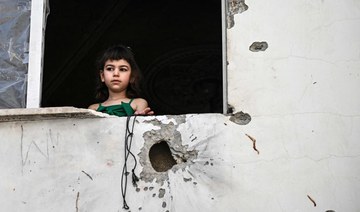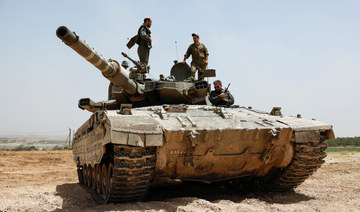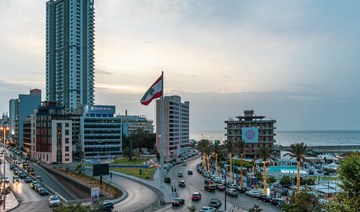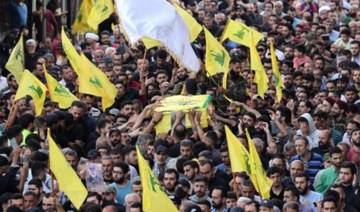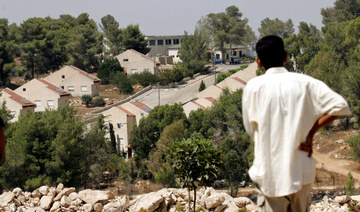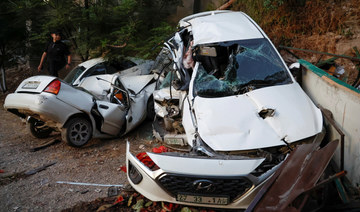ALIAGA, Turkey: A Turkish court ruled Monday to keep an American Christian pastor in custody, deeming him to be a flight risk, after his trial opened in a case that has raised tensions with Washington.
Andrew Brunson, who ran a Protestant church in the western city of Izmir, has been detained by Turkish authorities since October 2016. If convicted, he risks up to 35 years in jail.
Brunson — wearing a black suit, speaking fluent Turkish and sometimes bursting into tears — emphatically rejected all the charges against him at the first court hearing in the town of Aliaga north of Izmir.
He is accused of engaging in activities on behalf of the group led by exiled Muslim preacher Fethullah Gulen — who Ankara says is behind a failed 2016 coup — and the Kurdistan Workers’ Party (PKK).
Both the Gulen movement and the PKK are banned by Turkey as terror groups.
Brunson is also accused of espionage for political or military purposes.
The judge ordered Brunson to stay in jail, setting the next hearing for May 7.
The ruling was based on evidence given by witnesses in the case and the risk that Brunson might flee.
The United States expressed concern.
“We have seen no credible evidence that Mr.Brunson is guilty of a crime and are convinced that he is innocent,” State Department spokeswoman Heather Nauert said.
“We hope that the judicial system in Turkey will resolve his case in a timely, fair and transparent manner.”
In an indication of the importance of the case for Washington, the hearing was attended by Sam Brownback, the US ambassador at large for religious freedom, and Senator Thom Tillis from Brunson’s home state of North Carolina.
“We are very disappointed. If anything, I think the information that has been presented today creates a more compelling reason why he is innocent,” Tillis told reporters after the ruling.
Brunson reacted with emotion, telling his wife Norine in English: “I am going crazy. I love you.”
He had earlier told the judge tearfully: “I want to return my home. For 16 months, I have been separated from my wife.”
“I want the whole truth to be revealed. I reject all the accusations in the indictment. I haven’t been involved in any illegal activity,” Brunson told the court.
“I haven’t done anything against Turkey. On the contrary, I love Turkey. I have been praying for Turkey for 25 years.”
He moved to the country in 1993 and opened his Izmir church in 2010.
The Brunson case has further hiked tensions between NATO allies Turkey and the United States, with US President Donald Trump raising the issue in talks with Turkish counterpart Recep Tayyip Erdogan.
Relations are already strained over American backing for a Kurdish militia in Syria despised by Ankara and the jailing of two employees at American missions in Turkey.
“That relationship is going to have difficulty in moving forward as long as Andrew Brunson is incarcerated,” Brownback told reporters at the courthouse.
In September, Erdogan suggested that Turkey could free Brunson if Washington handed over Gulen, who lives in self-imposed exile in Pennsylvania.
Washington brushed off the offer but has been working intensely to secure the release of Brunson, one of several American nationals caught up in the crackdown after the failed coup against Erdogan in July 2016.
In February, NASA scientist Serkan Golge, a dual national, was jailed for 7.5 years for being a member of Gulen’s movement in a conviction denounced by Washington.
Senator Tillis said there was “no deal,” adding: “This is about what we believe is an innocent man who has been in prison for a year and a half.”
In his statement to the court, Brunson rejected the accusations of links to Gulen’s group, saying: “That would be an insult to my religion. I am a Christian. I would not join an Islamic movement.”
Gulen denies any role in the failed coup and says his Hizmet (Service) movement promotes a peaceful form of Islam.
Numbering just several thousand, the Protestant community in overwhelmingly Sunni Muslim Turkey largely comprises converts from Islam, expatriates and refugees.
The Turkish Association of Protestant Churches said in a report that 2017 was marked by continued hate crimes and physical attacks.
Brownback described the trial as a “religious freedom case.”
“Turkey, in its history, has been very open, so that’s one of the things that’s really troubling about this,” he said.
Turkish court rules to keep US pastor in custody, calling him a 'flight risk'
Turkish court rules to keep US pastor in custody, calling him a 'flight risk'
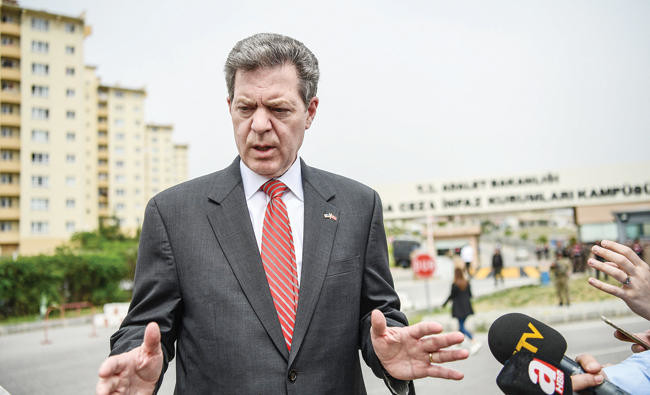
- If convicted or coup links, Pastor Brunson risks up to 35 years in jail
- Brunson rejects all the accusations, says he loves Turkey
Egyptians held nearly a year over deadly shipwreck are released from Greek jail after case dismissed
Egyptians held nearly a year over deadly shipwreck are released from Greek jail after case dismissed
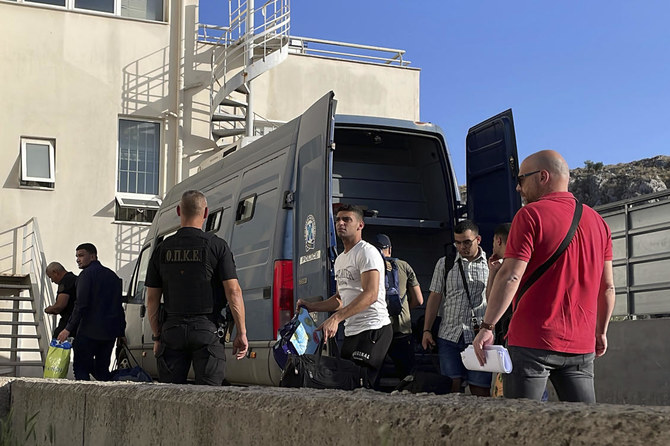
Eight of the nine were released from a jail outside the southern city of Nafplio on Wednesday evening
NAFPLIO, Greece: A group of Egyptians jailed for nearly a year pending trial for a deadly shipwreck were released from jail Wednesday, a day after a Greek court threw out the case against them on grounds that it had no jurisdiction to try it.
Nine Egyptians had been charged with being part of the crew of the Adriana, a massively overcrowded trawler that capsized and sank near Greece last June with an estimated 700 people on board while sailing from Libya to Italy. Only 104 people survived – all men, mostly from Syria, Egypt and Pakistan — and 82 bodies were recovered.
The nine, who have been in pretrial custody since their rescue last year, had been charged with being members of a migrant smuggling ring and were accused of having caused the shipwreck. They had faced several life sentences if convicted.
But a court in the southern Greek city of Kalamata on Tuesday ruled it had no jurisdiction to try the case, as the shipwreck occurred in international waters, none of those involved had been trying to enter Greece, the ship was not Greek flagged and no Greek citizens were on board.
The Egyptians’ defense team had argued that the nine were not crew members of the ill-fated trawler but had been paying passengers who were mistakenly identified as crew by nine other survivors, and that they were being used as scapegoats by authorities eager to put all the blame for the tragedy on the trawler’s crew.
Eight of the nine were released from a jail outside the southern city of Nafplio on Wednesday evening. They were transferred to a police station in the city, where they were to remain in custody overnight pending further procedures. It was not immediately clear when they would be fully released from custody.
The ninth defendant was to be released from a different jail.
The massive loss of life in the sinking of the Adriana in the early hours of June 14, 2023, renewed pressure on European governments to protect the lives of migrants and asylum seekers trying to reach the continent. The European border protection agency Frontex says illegal border detections at EU frontiers increased for three consecutive years through 2023, reaching the highest level since the 2015-2016 migration crisis, driven largely by arrivals by sea.
The exact circumstances of how the Adriana sank remain unclear. The trawler was sailing in international waters but within Greece’s search and rescue area of operations, and a coast guard patrol boat and passing merchant ships were near the vessel for several hours. Greek authorities have said the trawler’s crew repeatedly refused offers of help, insisting it wanted to continue to Italy.
Several survivors have said the boat capsized after the Greek coast guard attempted to tow it, an accusation Greek authorities have vehemently denied. A Naval Court investigation into the sinking is still underway.
Speaking at the courthouse after the case was dismissed on Tuesday, Dimitris Choulis, one of the lawyers in the defense team for the nine Egyptians, said attention should turn to how the Adriana sank.
“The court today had to be very brave to issue this decision, and to say that these people are not the smugglers,” Choulis said.
The lawyer blamed the tragedy on the Greek coast guard and Europe’s migration policies, and said it was essential to “make sure that nothing like that would happen again.”
From wedding photographer to water queue: Gaza mother mourns lost dream life
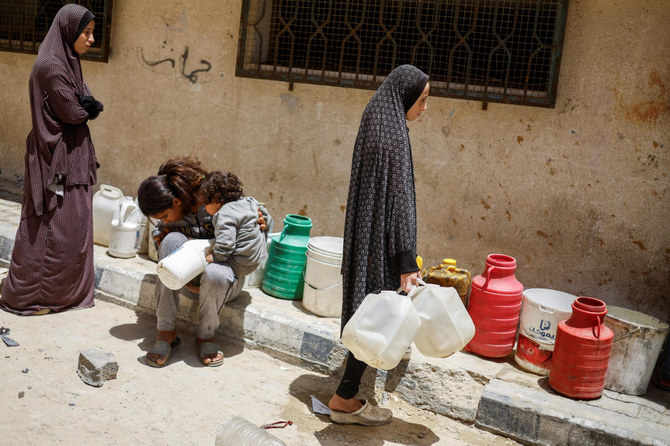
- The mother of seven is one of over two million Gazans who struggle to survive in the eighth month of an Israeli siege
- "I'm a wedding photographer. Someone like me should be going out and living well and spending money on their children," Abdulati said
KHAN YOUNIS, Gaza Strip: Falasteen Abdulati mourns her vanished good life as a wedding photographer as she wearily queues day after day for scarce drinking water in a rubble-strewn street in south Gaza, fearing for the future of her children.
The mother of seven is one of over two million Gazans who struggle to survive in the eighth month of an Israeli siege and invasion triggered by a cross-border Hamas attack, with food, drinking water, medical care and safe shelter hard to find.
"I'm a wedding photographer. Someone like me should be going out and living well and spending money on their children," Abdulati, 35, said, laboriously filling a few buckets with water from a battered barrel in the city of Khan Younis.
"Our life has (been reduced) to the simplest needs. It is work and exhaustion. Nothing else. The dream that I had as a wedding photographer to open a studio and to get cameras and to make people happy, is lost. My dream is lost."
She continued: "Every morning we wake up at 7 o’clock and of course the first thing we think about is water," she said. "We come here and wait in the long queue, just to fill up four buckets with water. Other than that, our shoulders hurt. There are no men to carry it for us. There is no one but us. Women are the ones working these days."
Israel's assault on the tiny, heavily urbanised coastal enclave has displaced over three-quarters of the 2.3 million Palestinian population and demolished its infrastructure.
"The future of my children that I worked tirelessly for is lost. There are no schools (functioning), no education. There is no more comfort in life," said Abdulati.
"No safety," she added, referring to the threat of shelling or raids that Israel says target Hamas militants holed up in densely-packed residential neighbourhoods.
Abdulati, dressed in a body-length robe and head-covering, said the upheaval of war had turned the lives of Gaza women upside down. "Women are now like men. They work hard just like men. They're no longer comfortable at home."
Her husband is hospitalised with war injuries.
Breathing heavily, she lugged her buckets along a shattered, sand-covered street and up a dingy flight of cement stairs into the family flat. There she heated up the fresh water over a makeshift fire stove in a cluttered, cramped room dark for lack of electricity, watched intently by her young children.
"We are suffering due to a lack of gas because the border crossings are shut," she said, referring to Israel's siege that has severely restricted humanitarian aid shipments into Gaza.
"The water that I filled up must be rationed. I heat it up so I can wash the children, in addition to doing the dishes and washing clothes. The four buckets I can get per day are just not enough. I have to go back again and again."
Poverty in Lebanon tripled over a decade, World Bank says
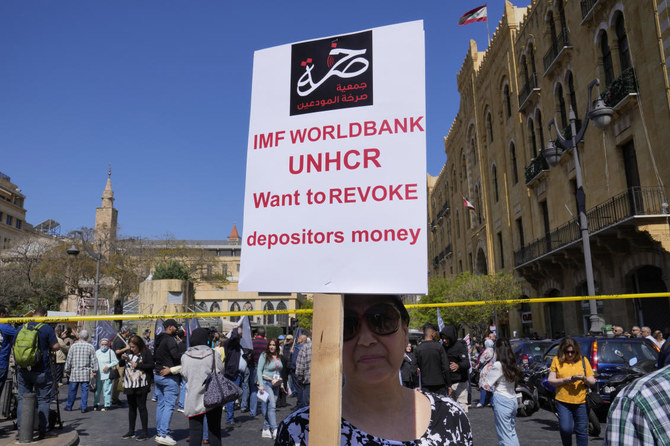
- The findings showed stark differences in poverty levels between different areas of the country
- Among Lebanese surveyed, the poverty rate in 2022 was 33 percent, while among Syrians it reached 87 percent
BEIRUT: Poverty in Lebanon tripled over the course of a decade during which the small Mediterranean country slid into a protracted financial crisis, the World Bank said Thursday.
The percentage of people in Lebanon living below the poverty line rose from 12 percent in 2012 to 44 percent in 2022, the bank said in a report based on surveys conducted in five of the country’s eight governorates.
The data provided the most detailed snapshot to date on the economic circumstances of the country’s population since the crisis that began in late 2019, although World Bank officials acknowledged it was incomplete as surveyors were not given access to three governates in the south and east of the country.
The findings showed stark differences in poverty levels between different areas of the country and between Lebanese citizens and the country’s large population of Syrian refugees.
In the Beirut governate, in contrast to the rest of the country, poverty actually declined from 4 percent to 2 percent of the population during the decade surveyed, while in the largely neglected Akkar region in the north, the rate increased from 22 percent to 62 percent.
Among Lebanese surveyed, the poverty rate in 2022 was 33 percent, while among Syrians it reached 87 percent. While the survey found an increase in the percentage of Lebanese citizens working in unskilled jobs like agriculture and construction, it found that most Lebanese still work in skilled jobs while the majority of Syrians do unskilled labor.
The report also measured “multidimensional poverty,” which takes into account access to services like electricity and education as well as income, finding that some 73 percent of Lebanese and 100 percent of non-Lebanese residents of the country qualify as poor under this metric.
Beginning in late 2019, Lebanon’s currency collapsed, while inflation skyrocketed and the country’s GDP plummeted. Many Lebanese found that the value of their life savings had evaporated.
Initially, many saw an International Monetary Fund bailout as the only path out of the crisis, but since reaching a preliminary agreement with the IMF in 2022, Lebanese officials have made limited progress on reforms required to clinch the deal, including restructuring the ailing banking sector.
An IMF delegation visiting Beirut this week found that “some progress has been made on monetary and fiscal reforms,” the international financial institution said in a statement, including on “lowering inflation and stabilizing the exchange rate,” but it added that the measures “fall short of what is needed to enable a recovery from the crisis.”
It noted that reforms to “governance, transparency and accountability” remain “limited” and that without an overhaul of the banking sector, the “cash and informal economy will continue to grow, raising significant regulatory and supervisory concerns.”
The World Bank has estimated that the cash economy makes up 46 percent of the country’s GDP, as Lebanese distrustful of banks in the wake of the crisis have sought to deal in hard currency.
The flourishing cash economy has created fertile ground for money laundering and led to concerns that Lebanon could be placed on the Paris-based watchdog Financial Action Task Force’s “grey list” of countries with a high risk of money laundering and terrorism financing.
Two-day Israeli raid on West Bank city leaves 12 Palestinians dead
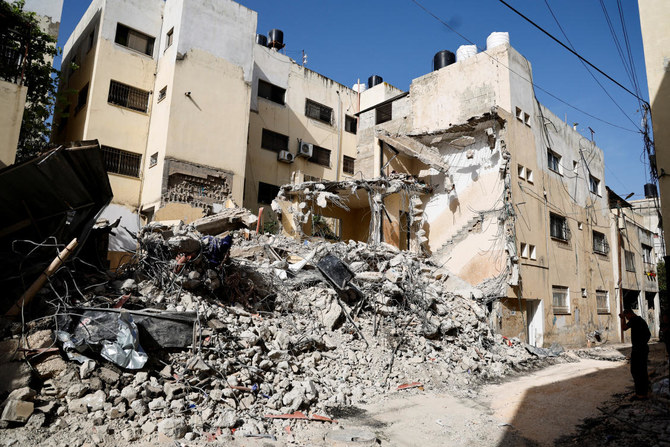
- Israeli troops withdrew from the city after carrying out raids in the city’s refugee camp and exchanging fire with masked gunmen
- Four children among the dead, and 25 wounded during the fighting
JeNIN: A two-day Israeli raid on the occupied West Bank city of Jenin killed at least 12 Palestinians, health authorities and an AFP correspondent said Thursday.
Israeli troops withdrew from the city early Thursday, the correspondent said, after carrying out raids in the city’s refugee camp and exchanging fire with masked gunmen in a nearby neighborhood in the city center.
The Palestinian health ministry in Ramallah said Israeli forces had killed 12 people including four children, and wounded 25 during the fighting which began on Tuesday morning.
The official Palestinian news agency Wafa and medical charity Doctors Without Borders reported that surgeon Usaeed Jabareen, from Jenin’s Khalil Suleiman government hospital, was among those killed on Tuesday.
An AFP correspondent on Thursday saw five bodies at the hospital morgue, including Jabareen’s.
A schoolteacher and a student were also among the dead, Wafa reported, quoting hospital director Wissam Bakr.
Several of the bodies were draped in flags and carried among crowds of Palestinians, including armed militants, through the streets as gunfire rang out.
Both Palestinian president Mahmud Abbas and Palestinian militant group Hamas condemned the raid.
Israel’s army said on Wednesday troops had “exchanged fire with armed men and killed a number of terrorists, including two terrorists who threw explosives at the forces.”
The army said it had raided the house of Ahmed Barakat, who was suspected of involvement in an attack on an Israeli civilian last year.
Meir Tamari, 32, was killed in May 2023 at the entrance to a Jewish settlement in the occupied West Bank, medics and military officials said at the time.
Jenin has long been a stronghold of Palestinian militant groups, and the Israeli army routinely carries out raids in the city and adjacent camp.
The West Bank, which Israel has occupied since 1967, has seen a surge in violence for more than a year, but especially so since the Israel-Hamas war erupted on October 7.
At least 518 Palestinians have been killed in the territory by Israeli troops or settlers since the Gaza war broke out, according to Palestinian officials.
Attacks by Palestinians have killed at least 12 Israelis in the West Bank over the same period, according to an AFP tally of Israeli official figures.
The Gaza Strip has been gripped by more than seven months of war since Hamas’s unprecedented October 7 attack on Israel that resulted in the deaths of more than 1,170 people, most of them civilians, according to an AFP tally of Israeli official figures.
Israel’s retaliatory offensive has killed at least 35,709 people in Gaza, most of them civilians, according to the Hamas-run territory’s health ministry.
Lebanese children narrowly escape deadly strike on Hezbollah fighter
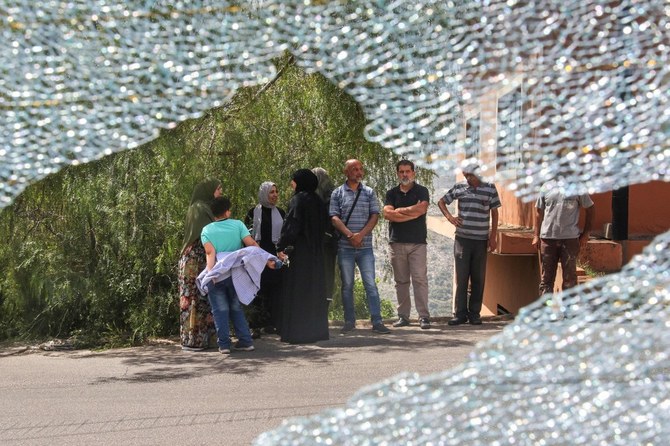
- The injured children were hospitalized with cuts from flying glass after the aerial attack
- “At first, we didn’t understand what was happening, and there was panic among the children,” said Ahmad Qubaisi who was driving the bus
NABATIEH, Lebanon: Lebanese school children on a minibus had a narrow escape Thursday when a drone strike killed a Hezbollah fighter in the car ahead, blowing out the windscreen of their vehicle and wounding three pupils.
The injured children were hospitalized with cuts from flying glass after the aerial attack, which state media and a source close to the Iran-backed militant group blamed on Israel.
“At first, we didn’t understand what was happening, and there was panic among the children,” said Ahmad Qubaisi, 57, who was driving the bus with 18 children on board.
“Suddenly a strike hit the car in front of us” near the town of Nabatiyeh, about 13 kilometers (eight miles) from the Israeli border, he said.
“The bus’s windshield shattered... I backed up and that’s when the second strike hit the car” in front of him, Qubaisi added.
The source close to Hezbollah told AFP that Israel was behind the strike, which killed a Hezbollah member who was named as Mohammad Ali Nasser Farran.
The attack was the latest in months of violence that has upended lives on both sides of the Lebanon-Israel frontier as the Israel-Hamas war has raged in Gaza.
Lebanon’s Hezbollah, an ally of Palestinian militant group Hamas, has traded near daily cross-border fire with Israel since the October 7 attack on southern Israel.
In the more than seven months since then, at least 429 people have been killed in Lebanon, mostly militants but also including 82 civilians, according to an AFP tally.
Israel says 14 soldiers and 11 civilians have been killed on its side of the border.
Despite the fatalities, both sides have so far calibrated the intensity and range of their strikes in efforts to avoid an all-out war between the two countries.
At the site of Thursday’s strike, an AFP photographer saw the charred car and blood stains on the road.
Lebanon’s official National News Agency reported “an enemy drone attack in the morning on the Kfardjal-Nabatiyeh road.”
The attack “killed a car driver” and “wounded three pupils” who were in a bus heading to school, it said.
One of the children, 11-year-old Mohammed Nasser, was lying on a bed in the Nabatiyeh government hospital, a bandage on his bruised forehead.
“The glass shattered... and the car in front of us was burning,” the boy recalled.
Fearing more strikes, he said, “we put our schoolbags on our heads.”
Standing beside him, his aunt showed AFP his blood-stained school uniform.
The boy’s father, Ali Nasser, said that “I was working in my field when my brother-in-law called telling me my son had been injured.”
“Fortunately, his injuries are not serious,” he added.
A Nabatiyeh school later said that the man killed, Farran, was also a physics teacher at the school and that it mourned his death.
Later Thursday, Hezbollah said it had launched dozens of rockets at a base in northern Israel.
It said its katyusha barrage was “in response to the assassination carried out by the enemy in Kafardjal, and the injuring and terrorizing of children.”


